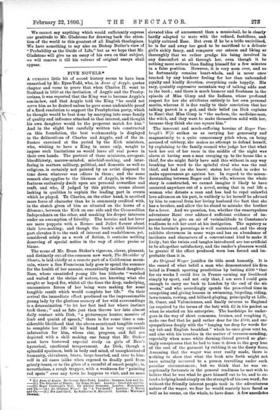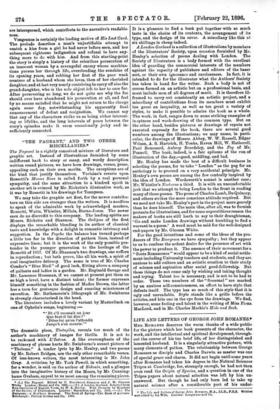FIVE NOVELS.*
A ctrxious little bit of secret history seems to have been unearthed by Mr. Eyre-Todd, who, in Anne of Argyle, quotes chapter and verse to prove that when Charles II. went to Scotland in 1650 at the invitation of Argyle and the Presby- terians, it was reported that the King was to become Argyle's son-in-law, and that Argyle told the King "he could not serve him as he desired unless he gave some undeniable proof of a fixed resolution to support the Presbyterian party, which he thought would be best done by marrying into some family of quality and influence attached to that interest, and thought his own daughter would be the properest match for him." And in the slight but carefully written tale constructed on this foundation, the best workmanship is displayed in the delineations of Charles and Argyle, and of the in- fluence exercised at the period by the Kirk ministers, who, wishing to have a King in name only, sought to impose such limitations as would leave all real power in their own hands. The portrait of these ministers, arrogant, bloodthirsty, narrow-minded, mischief-making, and inter- fering in matters military, political, and domestic as well as religious, is certainly not painted by an artist disposed to tone down whatever was odious in them ; and the same remark also applies to the likeness of Argyle, in whom the features exclusively dwelt upon are personal cowardice and craft, and who, if judged by this picture, seems almost lacking in qualities to explain the leading part in events which he played. To Charles, on the other hand, is ascribed more force of character than he is commonly credited with, in the sketch given of him as situated on the horns of a dilomm3, between the Kirk on one side and the Cromwellian Independents on the other, and masking his deeper interests under an assumption of frivolity. The heroine and her lover are mere puppets with a Romeo and Juliet flavour about their love-making ; and though the book's solid historical part elevates it to the rank of interest and readableness, yet, considered solely as a work of fiction, it contains nothing deserving of special notice in the way of either praise or blame.
The scene of Mr. Brain Stoker's vigorous, clever, pleasant, and distinctly out-of-the-common new work, The Shoulder of Shasta, is laid chiefly at a remote part of a Californian moun- tain, where a San Franciscan lady goes to spend the summer for the health of her anmmic, romantically inclined daughter, Ease, whose unsatisfied young life has hitherto "watched and waited at the shrine of nature, not knowing what she sought or hoped for, whilst all the time the deep, underlying, unconscious forces of her being were making for some tangible result which would complete her life." On their arrival the immediate effect produced on the impressionable young lady by the glorious scenery of her wild surroundings is a determination "to let her feet lead her where instinct took them;" and as fate just then throws her into almost daily contact with Dick, "a picturesque hunter, massive of limb and quaint of speech," there is for some time a con- siderable likelihood that the above-mentioned tangible result to complete her life will be found in her very excusable infatuation for him, whose rise, progress, and fall are depicted with a skill making one fancy that Mr. Stoker must have bestowed especial study on girls of Ease's hysterical, emotional temperament. As Dick, though a splendid specimen, both in body and mind, of unsophisticated humanity, chivalrous, brave, large-hearted, and true to him. self in all cases (alike when exposed to deadly peril from grizzly-bears, or to the gibes of a roomful of smart people), is, nevertheless, a rough trapper, with a weakness for "painting red spots" over any town he happens to visit, and no more • (1.) Anne of Argole. By George Byre-Todd. London : Sampson Low and Co. —(2.) The Shoulder of Shasta. By Brain Stiker. London : Constable and Co. —(8.) Roger Vanbrugh's Wife. By Adeline Sergeant. London : Hutchinson and Co.—(4.) An Original Wager. By '' A Vagabond." London: F. Warne and Co.—(5.) Rio Last Card. By Katherine S. Idacguoid. London : Ward and Da11110Y, elevated idea of amusement than a music-hall, he is clearly hardly adapted to mate with the refined, fastidious, and, highly cultured Ease. But even if he be a trifle uncivilised, he is far and away too good to be sacrificed to a delicate girl's sickly fancy, and conquers our esteem and liking so thoroughly that we rather grudge his being involved in any discomfort at all through her, even though it be nothing more serious than finding himself for a few minutes in a false position. However, it is very soon over, and as he fortunately remains heart-whole, and is never once touched by any tenderer feeling for her than unbounded• loyalty and kindly devotion, everything ends happily. His racy, quaintly expressive mountain way of talking adds zest to the book ; and there is much humour and freshness in the episode of Miss Gimp and the Indians, whose profound respect for her she attributes entirely to her own personal merits, whereas it is due really to their conviction that her talking parrot is a god, and their belief (as Dick explains to Ease) that Miss Gimp is "the sachem, the medicine-man, the witch, and they want to make themselves solid with her, because they think she can square him."
The innocent and much-suffering heroine of Boger Van- brugh's Wife strikes us as carrying her generosity and magnanimity to a quite unnecessary pitch when, on being accused of robbery, she makes no attempt to defend herself, by explaining to the family council who judge her that what took her out of her room in the middle of the night was alarm at having seen a man creeping up to the house like a thief, for she might fairly have said this without in any way breaking her word to the spiteful rival who was the real thief, and had (as she knew) stolen her cloak in order to make appearances go against her. In regard to the misun- derstanding between Roger and his wife, whereon the whole story is constructed, we cannot imagine it likely to have occurred anywhere out of a novel, seeing that in real life a woman who detests a man and has had to repel unlawful love advances on his part, is unlikely to let herself be advised by him to conceal from her loving husband the fact that she has a brother, and allow the hu sband to mistake the brother for a lover. And we question, too, whether the unscrupulous adventurer Rene ever adduce d sufficient evidence of im- pecuniosity to give an air of verisimilitude to Constance's readiness to rob her aunt at his instigation. The mystery as to the heroine's parentage is well maintained, and the story exhibits cleverness in some ways and has an abundance of incidents and characters of a conventional kind to make it lively ; but the twists and tangles introduced are too artificial to be altogether satisfactory, and the reader's pleasure would. be greater if the effect produced were less forced and im- probable than it is.
An Original Wager justifies its title most honestly. It is the record of what befell a man who demonstrated his firm belief in French sporting proclivities by betting 2500 "that for six weeks I could live in France earning my livelihood simply by sport, and not only that, I am sure I could gain enough to carry me back to London by the end of the six weeks," and who accordingly spends the prescribed time in competing and giving lessons in swimming, bicycling, riding, lawn-tennis, rowing, and billiard-playing, principally at Lille, St. Omer, and Valenciennes, and finally returns to England (as required by the terms of the bet) with 22 in his pocket as when he started on his enterprise. The hardships he under- goes in the way of short commons, bruises, and roughing it, make one feel that he paid rather dear for the 2.500, and one sympathises deeply with the "longing too deep for words for my tub and English breakfast" which he once gives vent to, and also with his troubles in the matter of trousers-mending, especially when some white darning-thread proved so glar- ingly conspicuous that he had to tone it down to the grey hue of the rest of the garment by rubbing it on the dusty floor4 Assuming that the wager was ever really made, there is nothing to show that what the book sets forth might not have actually occurred to a person travelling under such
peculiar circumstances ; but we think that he was ex- ceptionally fortunate in the general readiness be met with to believe that he was what he gave himself out to be, and to ex- tend a helping hand simply on the strength of his own word; for without the friendly interest people took in the adventurous nature of the wager, we fear he would scarcely have fared as well as he seems, on the whole, to have done. A few anecdotes are interspersed, which contribute to the narrative's readable- ness.
Vengeance is certainly the leading motive of His Last Card. The prelude describes a man's unjustifiable attempt to snatch a kiss from a girl he had never before seen, and her subsequent righteous indignation and refusal to have any- thing more to do with him. And from this starting-point the story is simply a history of the relentless persecution of an innocent woman by a revengeful enemy whose machina- tions pursue her through life, overclouding the sunshine of its opening years, and robbing her first of the poor weak creature of a husband whom she loves, then of her cherished daughter, and at last very nearly contriving to carry off also the grand-daughter, who is the sole object left to her to care for. After persevering so long, we do not quite see why the foe should ever have abandoned his persecution at all, and feel by no means satisfied that he might not return to the charge again some day, notwithstanding his apparently final announcement of defeat and resignation. We cannot say that any of the characters strike us as being either interest- ing or lifelike, and the long intervals of years between the story's episodes make it seem occasionally jerky and in- sufficiently connected.



































 Previous page
Previous page